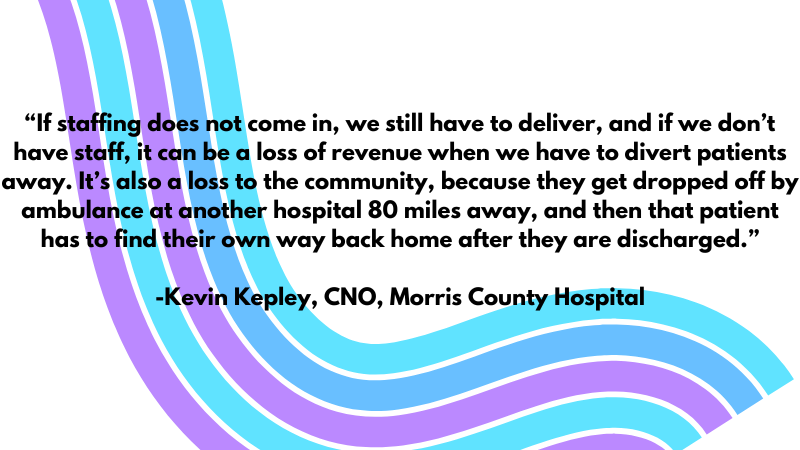CAH staffing amid census spikes and nursing shortages
Spikes in census, nurses calling in sick, and FMLA absences can leave rural hospitals searching for temporary nursing staff. Providing quality patient care and maintaining adequate staffing levels requires PRN staffing solutions that can adapt to changing needs.
For rural hospitals, workforce shortages can have significant consequences, from increased stress on staff to revenue losses. "It can create stress on nurses and affect patient care," says Kevin Kepley, Morris County Hospital chief nursing officer. "Especially in rural communities, where we’re not close to other places, you’ve got to have people in the building at night. Finding someone to step in when a nurse is sick or out on FMLA can be challenging because there just aren’t a lot of people in the area."
21-bed Morris County Hospital, a 2025 Top 100 Critical Access Hospital Award winner in Council Grove, Kan., found success in tackling these challenges by partnering with a tech-enabled, people-first, rural-experienced staffing solutions company. In 2024, the partnership led to increased fill ratios, low staff burnout, and a continuation of high-quality patient care.
Common workforce challenges in rural hospitals
Rural hospitals can struggle with workforce shortages caused by several factors:
- A smaller talent pool makes recruiting and retention more difficult.
- Unexpected, last-minute absences leave gaps in care.
- Seasonal or situational census surges require urgent staffing reinforcements.
Without a reliable supplemental PRN staffing partner to help fill gaps, challenges like these lead to increased staff burnout, longer wait times, and inefficiencies that affect patient care and even hospital revenue.
"If staffing doesn’t come in, we still have to deliver, and if we don’t have staff, it can be a loss of revenue when we have to divert patients away," Kepley explains. "It’s also a loss to the community because they get dropped off by ambulance at another hospital 80 miles away. Then that patient has to find their own way back home after they’re discharged."

The financial impact of staffing shortages
When hospitals are forced to divert patients due to inadequate staffing, they lose out on potential revenue. Additionally, the need for nursing staff can lead to overtime costs for existing staff, which can strain budgets.
Being understaffed can also result in lower patient satisfaction scores, which can lead to decreased revenue due to reduced patient volume, difficulty attracting and retaining staff, a poor reputation within the community, and decreased reimbursement from government programs. Partnering with a rural-vetted PRN staffing solutions company can help rural hospitals continue to provide high-quality care with highly skilled, carefully vetted, and rigorously credentialed rural health care workers.
The solution: On-demand, PRN staffing support
Recognizing the need for a reliable, on-demand PRN staffing solution, Morris County Hospital explored staffing resources that could help maintain adequate staffing levels quickly and efficiently. As Kepley explains, not having enough staff “creates extra stress, and then staff is more susceptible to flu and stuff like that, and then there is mental aspect and burnout. Not enough staff makes it easier to burn out, which then leads to more staff shortages, so being able to find someone to step in helps prevent burnout."
A key factor in addressing these challenges was identifying a staffing solutions partner who understands rural health care needs. “Sometimes it’s difficult to find the right candidates because you work with people that aren’t local to the area,” Kepley says. “Maybe it’s an organization that’s out of Dallas or New York, and you’re talking to someone who just sent in a resume, and you may not have agencies that have actually vetted the clinician. Some people you bring in may not have ever worked in rural health care, then they realize it’s different and it’s a unique challenge. Especially when they are covering ER, MS, and OB, rural nurses wear a lot of hats that many nurses just aren’t used to.”
Results and impact
Since partnering with a reliable rural PRN staffing solutions resource, Morris County Hospital has seen improvements in staffing coverage when census spikes or when dealing with staff absences.
Key outcomes
- Increased shift coverage: In 2024, Morris County Hospital filled 77 percent of its open PRN needs, greatly reducing potential gaps in patient care. Open needs were quickly and easily entered by the hospital on an online portal and sometimes filled within hours.
- Reduced burnout risk: Full-time nurses experienced less stress with better workload distribution, leading to higher morale.
- Maintained patient care standards: Fast response times to urgent needs and consistent, reliable staffing led to a continuation of excellent patient care. Regarding staff synergy, Kepley reports that his staff “all seem to be happy with the people they work with, complimentary that they have good skills, and get along well.”
On-demand PRN staff play a critical role in ensuring quality care, especially in unpredictable situations. "We’ve had OB patients come in unexpectedly, and we needed someone to help with med-surg patients while our staff focused on the delivery,” Kepley says. “Having the ability to bring in PRN staff at the last minute really helped ease the workload."

Lessons learned and best Practices
Morris County Hospital’s experience provides valuable insights for rural hospitals facing similar workforce challenges.
Key takeaways:
- Lean into on-demand PRN staff: Leveraging PRN staffing in advance can prevent last-minute crises. If a last-minute need arises, rural hospitals that partner with Cascade Health Services can be confident they have a partner who is doing all they can to find help.
- Find a partner with robust HR processes: Having confidence in your staffing partners' credentialing processes allows for a quick turnaround in getting new nurses on the floor. “The main thing is background checks, credentialing, and making sure nurses are current on licensure,” Kepley says. “It helps when someone else has already done all the credentialing.” Look for a partner that is Joint Commission certified, has a full HR team, and has technology that allows credentials to be viewed on-demand via a portal.
- Take advantage of technology offerings: Online on-demand staffing tools like Cascade Health Services’ Client Portal streamline PRN scheduling efforts. According to Kepley, the Client Portal “makes it easier. You can look at what the holes might be, put that out there on the Client Portal, and get a quick turnaround. In a matter of minutes you’re seeing that someone picked it up, and then you can move on to the next one..”
Strengthening rural health care with PRN staffing
For rural hospitals facing staffing challenges due to spikes in census, staff illness, or medical leave, connecting with a trusted rural staffing resource like Cascade Health Services can be a game-changer.
By embracing PRN workforce strategies with the help of rural trusted staffing partners, rural hospitals can ensure they have the right staff in place to meet patient needs, maintain high staff morale, and sustain long-term success.
NRHA adapted the above piece from Cascade Health Services, a trusted NRHA partner, for publication within the Association’s Rural Health Voices blog.
 | About the author: Ian Yazbec specializes in providing per diem (PRN) staffing solutions for rural, critical access, long-term acute care, and rehab hospitals across the U.S. With 10 years of health care and staffing experience, he leads initiatives to ensure high-quality service and workforce management tailored to the unique needs of rural hospitals. His focus is on improving patient care by helping rural hospitals maintain adequate staffing levels with high quality nursing professionals. |
